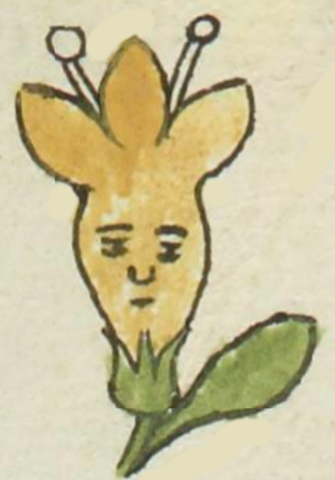Xochiteotl (MH712r)
This colorful compound glyph for the personal name, Xochiteotl (perhaps, “Divinity-Flower”), is attested here as a man’s name. It shows a frontal view of an upright yellow flower (xochitl) with a green base and stem and leaf on the viewer’s right. It has a three-partite petal arrangement, with two stamens or pistils rising above, each one with a little ball on the tip (the anthers). The body of the flower has a human face drawn on it, presumably to cover the -teotl part of the name.
Stephanie Wood
This digital collection includes a number of glyphs for the personal name Xochiteotl consisting of a considerable variety of expressions (see below).
In some flowers, such as this one, the anthers are rather pronounced. The anthers are the flower parts that produce and provide the pollen, which has the reproductive capacity that has been compared in Western cultures to semen.
Stephanie Wood
1560
Jeff Haskett-Wood
religión, flores, deidades, fuerzas divinas, fuerzas sagradas, nombres de hombres

xoch(itl), flower, https://nahuatl.wired-humanities.org/content/xochitl
teo(tl), a sacred force, divinity, deity, https://nahuatl.wired-humanities.org/content/teotl
"Flower-Deity" or "Sacred Flower" [H.B. Nicholson, in Mesoamerican Writing Systems, ed. Elizabeth P. Benson (1973), 28.]
posiblemente, Flor-Divinidad
Stephanie Wood
Matrícula de Huexotzinco, folio 712r, World Digital Library, https://www.loc.gov/resource/gdcwdl.wdl_15282/?sp=502&st=image
This manuscript is hosted by the Library of Congress and the World Digital Library; used here with the Creative Commons, “Attribution-NonCommercial-ShareAlike 3.0 License” (CC-BY-NC-SAq 3.0).











